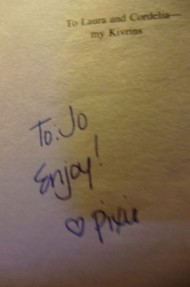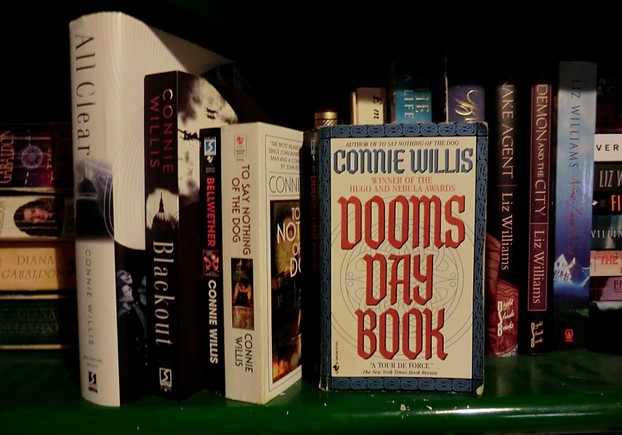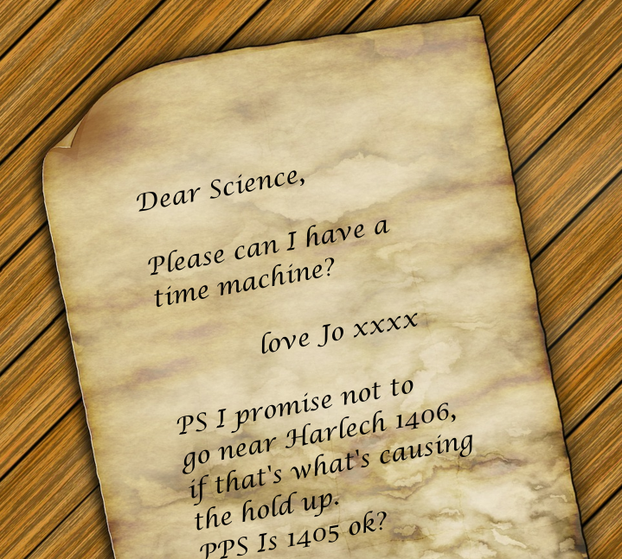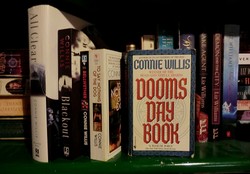Take classes in embroidery, fine needlework and other pursuits expected of a young lady in Medieval England. Practice etiquette relating to the same. Be tested on what values she - as a 21st Century woman - needs to unlearn, so not to take them so much for granted that she doesn't even notice her cultural expectations and confidence in certain circumstances.
Find a name, which has dozens of documented examples that it was in common usage at the time. Get it okayed by her professor and the University administration department.
More examinations in folklore, legends, superstitions, songs, everyday gestures, hymns, and all else that an English woman in the Middle Ages would have spent her whole life assimilating. To be crammed into Kirvin's mind and muscle memory within a couple of years.
With an option on extra studies in Medieval spoken French too. And cookery.
Kirvin is stressed. She's so close to her date with the science lab., and the net which is even now being set up with a 'scene' to cover her arrival in 1320. It will be like she's been thrown from a cart attached to a runaway horse, whose snapped reins now dangle from the wooden wreckage. That gives her reason to have a trunk with belongings close by.
She has to source all that stuff too, and check it to ensure that the scientists haven't accidentally added anything anachronistic. They aren't historians. They cannot be responsible for anything but the net. She's spent hours researching places remote enough to materialize unseen, but close enough to civilization that she won't have to trek with her trunk too far.
Then the technicians have to check each location to see whether the science will allow a transfer there. Finally Professor Dunworthy has to clear it all, the Board issue clearance for her trip, and the scientists engage in some dummy runs to ensure all goes smoothly.
Too much can go wrong. Until she's lying on that marker, in the net, surrounded by her luggage, feeling the air prickle strangely upon her skin, Kirvin can't relax. Then the weather takes a turn for the worse, and there's a virus going around, and so many members of staff are ill that the lab doesn't think she can go, and she and Dunworthy keep missing each other, leaving notes on doors to catch up.
Suddenly Kirvin is lying on a forest floor. All those months of hard work and panic have paid off. She's in the Middle Ages and what could possibly go wrong now?


 My copy of Doomsday Book is so well thumbed. The spine is all creased with bits of paper flaking off in three places. It has all the hallmarks of a novel which has been read a dozen times, carried around in bags and left open countless times on various surfaces.
My copy of Doomsday Book is so well thumbed. The spine is all creased with bits of paper flaking off in three places. It has all the hallmarks of a novel which has been read a dozen times, carried around in bags and left open countless times on various surfaces.



















 St Tydecho's Churches in West Waleson 09/03/2014
St Tydecho's Churches in West Waleson 09/03/2014
 Goodies for an Outlander Premiere Partyon 03/06/2015
Goodies for an Outlander Premiere Partyon 03/06/2015
 Holocaust Memorial Day Interview with Rainer Höss, Grandson of Rudolf Architect of Auschwitzon 01/24/2015
Holocaust Memorial Day Interview with Rainer Höss, Grandson of Rudolf Architect of Auschwitzon 01/24/2015
 Romantic Valentine Gifts for an Outlander Fanon 01/16/2015
Romantic Valentine Gifts for an Outlander Fanon 01/16/2015



Comments
I honestly believe that you'll love it. Though I wonder if we'll read the same book. You'll be coming from Mary's POV, while I'm there with Dunworthy and Kirvan.
I'm starting to read this book tonight! Much excitement awaits!
Your Mom has good recommendations, so I'll check it out.
I'll have to read it. :D
My mom has countered with a recommendation of the Room by Emma Donahue. (Though to me or to you it wasn't clear. She did let me know it's nothing like this book though).
Ah! So your Mum has read it. I had it in mind to send it to her.
I'm currently re-reading Doomsday Book about the billionth time. I keep thinking that you would absolutely love it. There a major plotline about a contagion. I won't say more for spoilers.
Okay, so I mentioned when you brought up this book that it was recommended to me a while back and I couldn't figure out if it had been you or my mother... I came to the conclusion it was you, because we had discussed the plot line. But I asked my mom and she said she's definitely recommended Connie Willis to me before....
Anyways, the last time I had the both of you recommending a book, I ended up really enjoying it so... lol